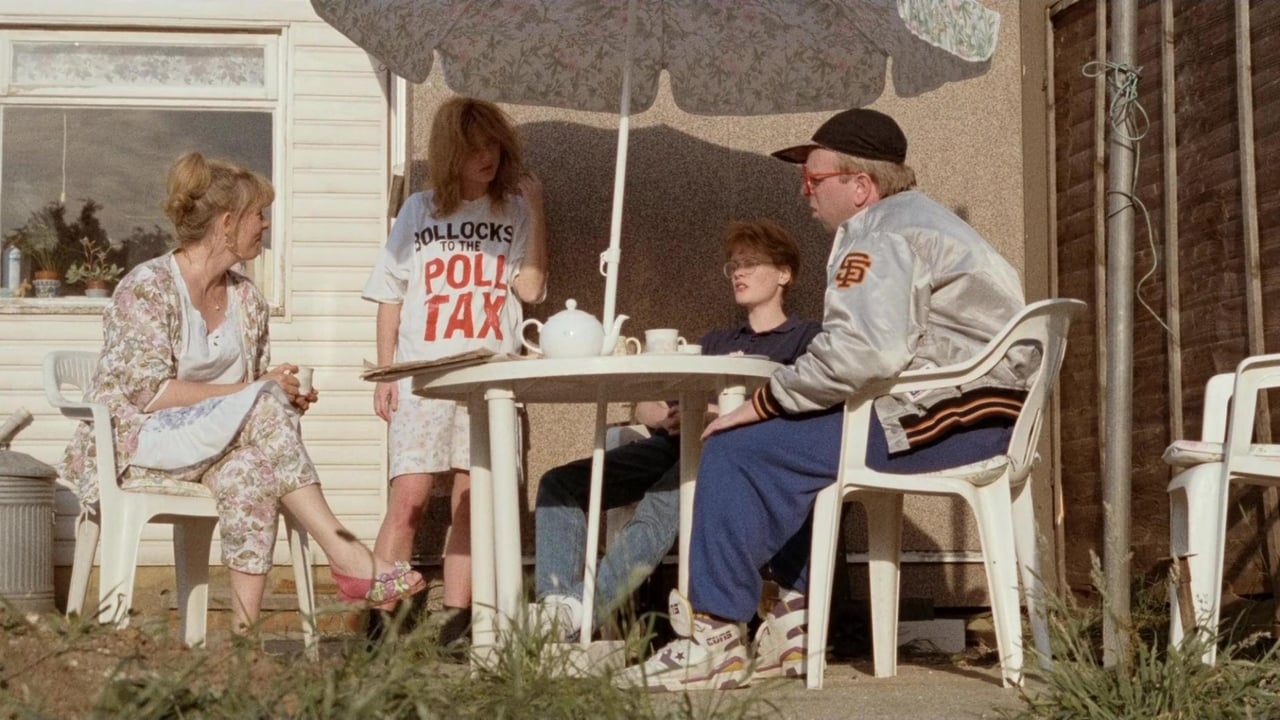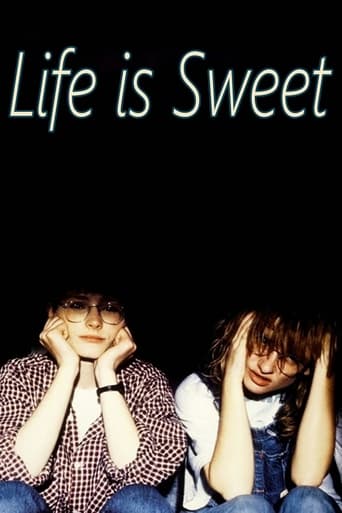



After playing with our expectations, this turns out to be a very different sort of film.
View MoreThis film is so real. It treats its characters with so much care and sensitivity.
View MoreExcellent and certainly provocative... If nothing else, the film is a real conversation starter.
View MoreStory: It's very simple but honestly that is fine.
UK films are not easily available on this side of the pond, so this reviewer was first exposed to Jane Horrocks in this wonderfully perfect little film, only to later catch her in Little Voice.To say she was brilliant in both films is an understatement. The odd thing is that the second film seems to be well-known worldwide but this one seems to have been lost in the shuffle.The genius here is taking a small but rock-solid cast and capturing the attention of the audience almost from the first scene, with the daily trials and tribulations of a family trying to survive the vicissitudes of the outside world and the internal prison of their own making.The entire cast is great, the writing sharp, the direction polished. But the performance from Horrocks -- and that voice! -- will haunt you forever.
View MoreJust north of London live Wendy, Andy, and their twenty-something twins, Natalie and Nicola. Wendy clerks in a shop, leads aerobics at a primary school, jokes like a vaudevillian, agrees to waitress at a friend's new restaurant and dotes on Andy, a cook who forever puts off home remodeling projects, and with a drunken friend, buys a broken down lunch wagon.What to make of this film? It seems like the focus is on the twins and how different they are, while all the other characters are just background. Those two alone are quite striking, with one being a bulimic anarchist and the other an androgynous female who could be mistaken for a boy. What is to be made of them? The title of the film can only be seen s ironic, as no one here is truly happy. Director Mike Leigh covers some of the same ground as he does in "Secrets and Lies", in that he explores the working class world of England. Although I do not think it is an intentional this time around, it is still unavoidable.
View MoreMike Leigh is one of the true independent auteurs in the British film industry, and one of the few major British directors who has not allowed himself to be seduced away by Hollywood. His films, generally based on modern urban English working-class or middle-class life, concentrate more on character than on action and have a very distinctive style which arises out of his equally distinctive method of working, based upon allowing a story to emerge through improvisation, rehearsals and discussions with his cast before shooting actually begins. He generally uses a select group of actors, including Jim Broadbent, Timothy Spall and his one-time wife Alison Steadman.Broadbent, Spall and Steadman all appear in "Life Is Sweet", a comedy based upon the lives of a family from the North London suburb of Enfield- father Andy, mother Wendy and their 22-year-old twin daughters Natalie and Nicola. Andy works as a chef, but hates his job and harbours ambitions of running his own business. He has bought a dilapidated fast-food van which, at some unspecified future date, he intends to clean and restore in order to start up a fast-food business, but has not taken any further steps towards realising his goal. Another major character is Andy's friend Aubrey, another chef, who has taken his own entrepreneurial ambitions a stage further by opening his own French restaurant named "The Regret Rien" after the Edith Piaf song.Like a number of British film-makers from the eighties and early nineties, Leigh made his films from an essentially left-wing position and was critical of the Conservative government of Margaret Thatcher. "Life is Sweet", which appeared in the last year of her premiership, can be seen as a veiled satire on the cult of the entrepreneur which flourished under Thatcherism and on the tendency to see business, both big and small, as the sole key to national success. The characters of Andy and Aubrey are well contrasted. Andy is a competent chef but lacks the drive to become a successful independent businessman; his ambitions never seem to amount to much more than vague daydreams. As Wendy says, he has "two speeds, slow and stop".Aubrey, by contrast, is a man whose inordinate faith in his own abilities is matched only by an incompetence which will surely doom his business career to failure. Much of the humour derives from the bizarre nouvelle cuisine dishes he takes a perverse pleasure in devising. (Saveloy on a bed of lychees, anyone?) When Aubrey's business does not work out as well as he hoped he takes refuge in alcohol.The film is as much about Andy's home life as his work life, if not more so. His two daughters, although twins, are completely unlike both in looks and in character. Natalie, crop-haired and chunky, is a tomboy who works as a plumber and spends her leisure time playing pool and drinking with her male workmates. Nicola, who is unemployed, is extremely thin, a sufferer from bulimia and a chain-smoker. Whereas Natalie is relatively placid, Nicola is neurotic, bitter, foul-tempered and much given to hurling abuse at her family and acquaintances. She claims to believe in various left-wing causes- "capitalist!" is her favourite insult for her father because of his business ambitions- but never does anything active to further them. Natalie does not appear to have any romantic interests in her life- none of her male drinking chums count as boyfriends, and although some have seen her as a stereotypically "butch" lesbian, she has no girlfriends either. Nicola, by contrast, has an active sex life, although a rather odd one- she likes her rather reluctant boyfriend to smear chocolate spread over her chest.The two acting performances which really stand out come from Spall as Aubrey- a brilliant comic creation- and Jane Horrocks as Nicola, an equally brilliant tragi-comic one. The film is, however, really an good example of ensemble acting, and there are also great contributions from Steadman as Wendy and Broadbent as Andy.With its general theme of frustrated ambition and a character as unbalanced as Nicola, "Life is Sweet" could easily have been made as a tragedy. Yet that title is not meant ironically. Leigh might not be a large-C Conservative, but this film suggests that he is a small-c conservative when it comes to family values, and the film is very much about family life. For all their eccentricities, the family at the centre of "Life is Sweet" is not intended to be portrayed as a dysfunctional one. It is a family that functions, although in ways that outsiders might perceive as strange. The sensible, steadfast Wendy and Andy, who beneath some surface peculiarities is a deeply caring man, have an unconditional love for their daughters. They are prepared to make allowances for Nicola's behaviour, which is the result of emotional insecurities rather than spitefulness or malevolence. "We don't hate you! We bloody love you, you stupid girl!" (We learn that Wendy got pregnant with the twins as an unmarried teenager but refused to have an abortion because of a belief in the sanctity of life).After all the storms, the film ends on a note of calm and hopefulness. This is one of the most distinctive, and one of the best, British social comedies from the early nineties. 8/10
View MoreLife is Sweet was the first Leigh film I saw, about 6 years ago. To mark his new film, out this week in cinemas I bought the DVD of this specially.I settled to reacquaint myself with Leigh's regular team of character actors. I've seen all his films subsequently and have a feel of his breadth of work, from tragicomedy to drama. As such, I found the characters' mannerisms and foibles to be grating and really quite irritating, as if they'd been overacted, or misjudged. At first. But, as with any family that open their front door to you and until you see and hear how they click and survive as a family unit, you really do wonder what you've let yourself in for. So, having 'moved in', within 15 minutes I was warming to them. Ten more and I felt I knew them and was totally immersed in their humour and lives. I'm still surprised as to how political and social statements from the late '80's (as well as a trip down memory lane; rusty Ford Escorts and shell suits) manifest themselves through the cast. Bit like the kitchen sink dramas of the '60's but without the grainy black & white, the grime and hitting womenfolk. Leigh's canvas is much wider and behind everyday doors in everyday streets lie the often dismissed emotional and confused pains of modern life. Ordinary people whose problems seem to be teetering on the edge and to them, unique. The acting in those more poignant scenes is, as I sometimes describe, natural, as is. As you'd expect a real person to do. With broad humour, wit and a brisk pace this is still a sparkling snapshot of British semi-suburbia twenty years ago. Nothing too shocking or gratuitous. Not the red-hot, pure grit of hard unemployment of Shane Meadows but the sort of folk we know about, or of, who work alongside us, holding the country together. Somehow.Sometimes, watching this, you'll wonder how, though....
View More